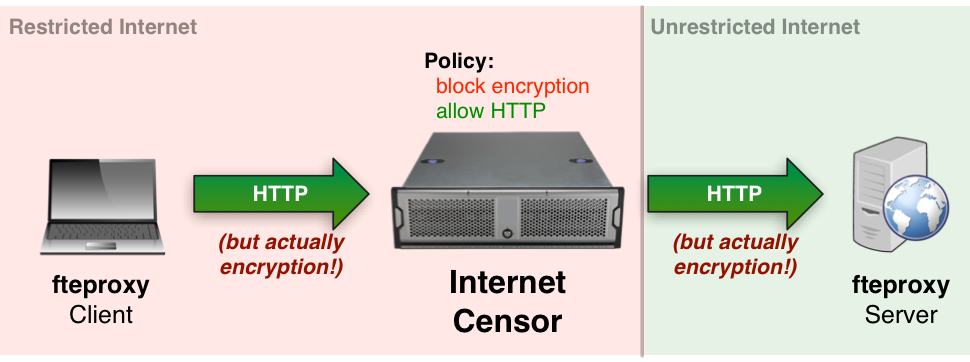mirror of
https://github.com/vimagick/dockerfiles.git
synced 2024-11-24 08:52:15 +02:00
| .. | ||
| docker-compose.yml | ||
| Dockerfile | ||
| Dockerfile.debian | ||
| README.md | ||
fteproxy
fteproxy provides transport-layer protection to resist keyword filtering, censorship and discriminatory routing policies.
Its job is to relay datastreams, such as web browsing traffic, by encoding streams as messages that match a user-specified regular expression.
fteproxy is fast, free, open source, and cross platform. It works very well with vimagick/openvpn(TCP mode).
In the following example, I will setup a server/client pair to connect www.google.com:80.
Internet Censorship
The problem
The solution
Create a docker-compose.yml
server:
image: vimagick/fteproxy
ports:
- "80"
environment:
- "MODE=server"
- "SERVER_IP=0.0.0.0"
- "SERVER_PORT=80"
- "PROXY_IP=www.google.com"
- "PROXY_PORT=80"
- "KEY=CB2FBA2BC70490526E749E01BB050F6B555964290DFF58CF24785B4A093F7B18"
client:
image: vimagick/fteproxy
ports:
- "9009:80"
links:
- server
environment:
- "MODE=client"
- "SERVER_IP=server"
- "SERVER_PORT=80"
- "CLIENT_IP=0.0.0.0"
- "CLIENT_PORT=80"
- "KEY=CB2FBA2BC70490526E749E01BB050F6B555964290DFF58CF24785B4A093F7B18"
To generate random key:
xxd -u -p -c32 /dev/urandom | head -n1
Run fteproxy server/client
$ docker-compose up -d
Creating fteproxy_server_1...
Creating fteproxy_client_1...
$ docker-compose ps
Name Command State Ports
----------------------------------------------------------------------------------
fteproxy_client_1 /bin/sh -c /fteproxy/ftepr ... Up 0.0.0.0:9009->80/tcp
fteproxy_server_1 /bin/sh -c /fteproxy/ftepr ... Up 0.0.0.0:32768->80/tcp
Test with curl
$ curl http://localhost:9009/
<HTML><HEAD><meta http-equiv="content-type" content="text/html;charset=utf-8">
<TITLE>302 Moved</TITLE></HEAD><BODY>
<H1>302 Moved</H1>
The document has moved
<A HREF="http://www.google.com/">here</A>.
</BODY></HTML>

